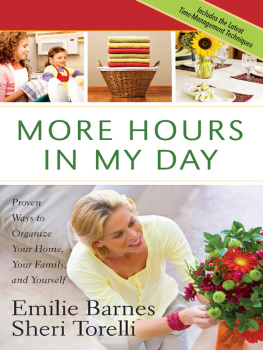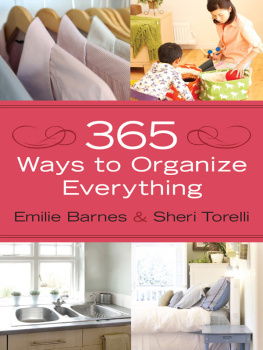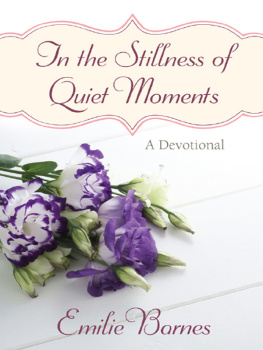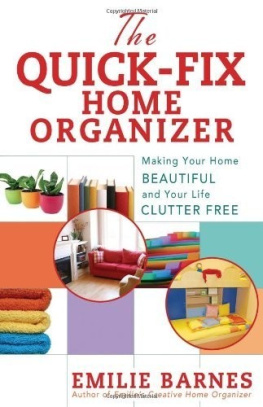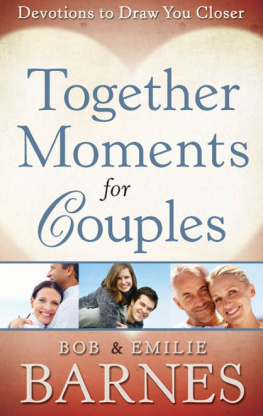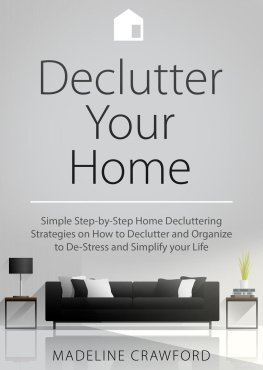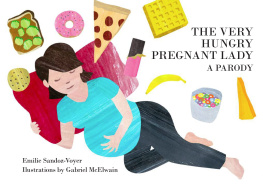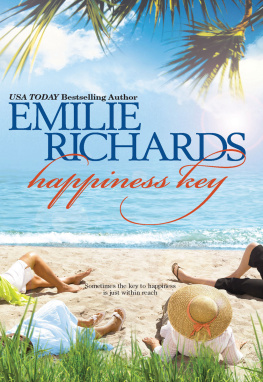MORE HOURS
IN MY DAY
Emilie Barnes
Sheri Torelli

HARVEST HOUSE PUBLISHERS
EUGENE, OREGON
Unless otherwise indicated, all Scripture quotations are taken from The Living Bible, Copyright 1971. Used by permission of Tyndale House Publishers, Inc., Wheaton, IL 60189 USA. All rights reserved.
Verses marked NASB are taken from the New American Standard Bible, 1960, 1962, 1963, 1968, 1971, 1972, 1973, 1975, 1977, 1995 by The Lockman Foundation. Used by permission. (www.Lockman.org)
Verses marked NIV are taken from the HOLY BIBLE, NEW INTERNATIONAL VERSION. NIV. Copyright 1973, 1978, 1984 by the International Bible Society. Used by permission of Zondervan. All rights reserved.
Verses marked GNT are taken from the Good News TranslationSecond Edition 1992 by American Bible Society. Used by permission.
Verses marked NLT are taken from the Holy Bible, New Living Translation, copyright 1996. Used by permission of Tyndale House Publishers, Inc., Wheaton, IL 60189 USA. All rights reserved.
Some material in this book is drawn from Bob and Emilie Barnes books 15-Minute Money Manager and Survival for Busy Women.
Every effort has been made to give proper credit for all stories, poems, and quotations. If for any reason proper credit has not been given, please notify the author or publisher and proper notation will be given on future printing.
Cover photos Getty Images; Alamy
Cover by Dugan Design Group, Bloomington, Minnesota
MORE HOURS IN MY DAY
Copyright 2008 by Harvest House Publishers, Inc.
Published by Harvest House Publishers
Eugene, Oregon 97402
www.harvesthousepublishers.com
Library of Congress Cataloging-in-Publication Data
Barnes, Emilie
More hours in my day/Emilie Barnes.
p. cm.
ISBN-13: 978-0-7369-2253-1
ISBN-10: 0-7369-2253-9
Rev. ed. of: More hours in my day. 1982.
Includes bibliographical references.
1. Time managementReligious aspectChristianity. 2. WomenTime management. 3. Home economics. 4. WomenConduct of life. 5. WomenReligious life. I. Barnes, Emilie. More hours in my day. II. Torelli, Sheri. III. Title.
BV4598.5.B371994
All rights reserved. No part of this publication may be reproduced, stored in a retrieval system, or transmitted in any form or by any meanselectronic, mechanical, digital, photocopy, recording, or any otherexcept for brief quotations in printed reviews, without the prior permission of the publisher.
Printed in the United States of America
08 09 10 11 12 13 14 15 16 /LB-NI/ 10 9 8 7 6 5 4 3 2 1
Contents

You created my inmost being; you knit me together
in my mothers womb. I praise you because I am
fearfully and wonderfully made.
P SALM 139:13-14 NIV
I rene was a Jewish girl, the oldest of five children, born in Brooklyn, New York. When she was a teenager, her mother died giving birth to a baby girl. Irenes Papa, a gifted tailor, died a few years later, leaving the teenager to raise her brothers and sisters. Jobs and money were in California, so the young family headed for Hollywood to make a life for themselves.
As a young adult, Irene designed and sewed tennis dresses for movie stars in the early 1920s. She worked hard to support herself and her brothers and sisters. When she was 29, she met Otto Klein, a 40-year-old chef for Paramount Studios. They married in 1930.
Irene wanted children, but Otto wouldnt hear of it. As a German Jew and a veteran of World War I, Otto had barely escaped the war with his life. He wasnt about to bring children into such an angry world. Twice Irene became pregnant, and twice he forced her into abortions. When she became pregnant a third time, Irene refused to terminate the pregnancy. In July 1934, a beautiful son, Edmund Francis, was born. Four years later, on April 12, 1938, Emilie Marie was born. Otto adored his baby daughter, but his young son became the victim of a father filled with hatred from abuse hed suffered as a child.
Otto was a creative and artistic man. As an orphan in Vienna he was placed in the royal palace as a kitchen helper. His exceptional ability eventually gained him training by the finest chefs in Europe, and he became an expert Viennese chef. He escaped war-torn Europe, traveling first to New York and then to Hollywood. He became a chef to movie stars, including Clark Gable, Mickey Rooney, Lana Turner, Greta Garbo, Mario Lanza, Douglas Fairbanks, Judy Garland, and many more. Yet deep inside this successful man was a little boy still hurting from the loss of his parents.
Otto turned to alcohol to escape his pain, eventually jeopardizing his career and his family. His drinking fueled his angry perfectionism, resulting in violent outbursts at the shortcomings of his coworkers, wife, and children.
Irenes fear for her safety and that of her children smothered her fun-loving, sanguine temperament. Edmund stored his anger for his abusive father, releasing it later in rebellion. And Emiliethats mebecame a very bashful, quiet child.
I have only a few happy memories of my father. When I was nine years old we moved to Long Beach, California, where Daddy managed a restaurant called Ormandos. He would take me on walks along the beach, and we would fish off the pier. He gave me a beautiful blue bicycle on my tenth birthday.
Daddy lost his job at Ormandos due to his temper and drinking. My brother, Edmund, who was almost 14 at the time, began his years of rebellion. Then Daddy became very ill. He refused to listen to his doctors. Instead he got mad at them and demanded that they make him well.
Because of my father, the emotional thermometer in our home was almost always on high. It was my job to try to keep peace, and I was able to cool Daddys temper at times. He adored me and never abused me. But I hurt inside because of what he did to my mother and brother. I suffered from nightmares, and I often wished Daddy would die so we would be free of his hot temper.
Daddy didnt let Mama cook very often because she didnt meet his gourmet standards, but she was also great in the kitchen. Her corned beef cabbage rolls and other Jewish meals are a delicious memory. Occasionally Mama and Daddy would prepare a meal together, and I would sit on the drainboard watching and learning. Those were happy times for meprobably because Daddy wasnt drinking on those days.
The summer after my eleventh birthday Daddy died, and we were released from his bondage. I cried as I looked toward heaven and wondered about the afterlife, but I quickly pushed those thoughts out of my mind. Mama was now a single parent with two children to care for. Being unemployed and uninsured, Daddy had left us with hospital and doctor bills.
My aunt and uncle kept us afloat financially and helped my mother open a small dress shop in Long Beach. We lived behind the store in a three-room apartmentkitchen, living room, and one bedroom. It was perfect for our needs. We gave Edmund the bedroom, and Mama and I slept together in a Murphy bed in the living room. Mama gave me the responsibility of caring for those three rooms while she ran the dress shop. I painted the whole apartment myself, even though Id never painted in my life. I decorated the walls and, with help from Mama, made curtains, tablecloths, and chair covers. I planted flowers in our window box and kept the bathroom and kitchen spotless. Under Mamas direction I prepared meals and washed the laundry.
Next page
